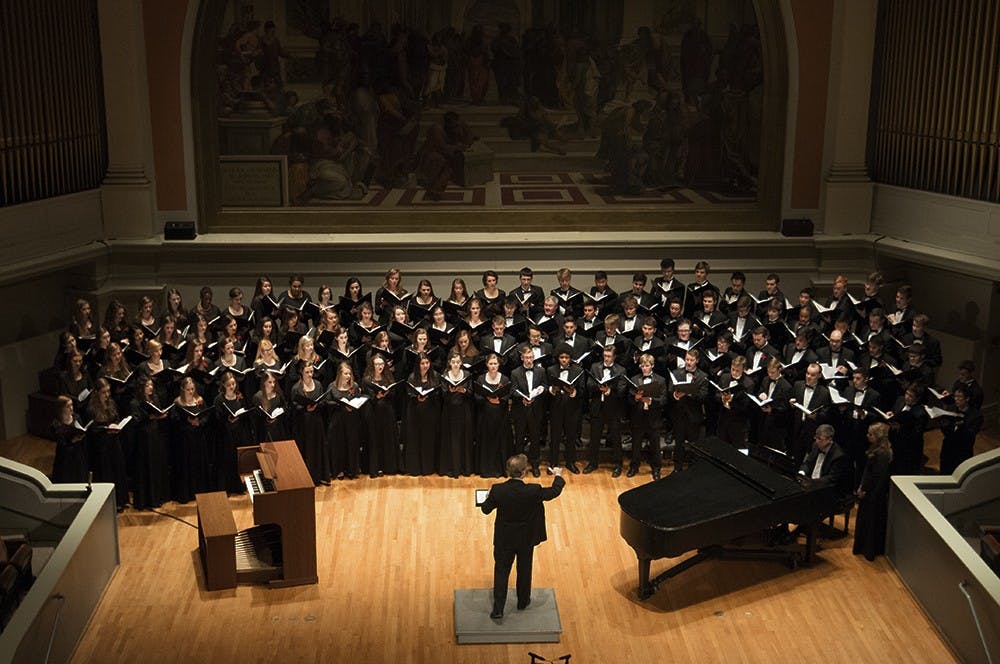The University Singers and Chamber Singers’ “American Pioneers” concert this past Friday shook the foundations of Old Cabell Hall and highlighted talented composers from the early 20th century. Director and conductor Michael Slon said he chose to perform solely American-composed selections instead of blending in international composers.
“My idea was to feature a program of music of American composers who were specifically moving in a way away from European models toward the American sound,” Slon said. “The period we’re focusing on is the earlier half of the 20th century, and of course the biggest [names] of that time are Ives, Bernstein, and Copland… It [is] exciting for the singers as well as for the audience to experience.”
In the concert Slon demonstrated what he called a ”cross-pollination” in choral sound. While the audience heard evidence of traditionally European sounds that make the base of American music, the ensemble also showed how uniquely American music began to take the stage. An old European sound moved in new, dynamic directions.
The first selection — “Hashkiveinu” by Leonard Bernstein — reflects not only the composer’s love of tritones, but also his ability to blend powerful and delicate moments. Interestingly, it was the only work Bernstein wrote for a Jewish religious service. “Hashkiveinu” served as the perfect introductory piece for the night, giving the audience a survey of the talent and hard work of the ensemble. Randall Ball, a tenor soloist for the opening number, brought a bold and skillful tone to the piece.
The next piece, “Jubilant Song,” lived up to its name. Featuring soprano Brooke Dalby, a clear impression of true joy came through and provided a nice upbeat contrast to the rest of the repertoire. The first piece of the night to incorporate American poetry, this piece included lyrics adapted from a poem by Walt Whitman.
Similarly, “The Road Not Taken” — originally written by Robert Frost and later set to music by the renowned Randall Thompson — offered a musical analysis of the legendary poem. Thompson repeats the last verse, “And that has made all the difference,” with various melodic variations, the first being a slight upward intonation at the end of the phrase to mimic the indecision of which road to take.
Although Thompson writes this technique into the score, the University Singers added an element of distance to the phrase in order to masterfully express the sentiment within the original text. Such interpretation also appeared in their following piece, Thompson’s “The Pasture.”
The ensemble later performed “The Lobster Quadrille” by Irving Fine. This cheerful selection gave the audience a momentary reprieve from the deeper songs while maintaining a professional seriousness.
To end the first half of the show, the Chamber Singers performed Aaron Copland’s “In the Beginning” — an incredibly complex, difficult and jaw-dropping piece which recounts the biblical story of creation. Serving as the climax for the entire performance, its demanding score included many key changes and consistently precise vocal tone, all in a cappella. For any other ensemble, this would amplify careless mistakes. However, the group impressed throughout, gripping the audience until the last note. The audience could not breathe until moments after this note. Sarah Davis, a mezzo-soprano, headed this song as the lead vocalist and astonished with a beautifully trained voice.
“[I choose] good challenging pieces for the singers, which stretches them in positive musical and educational ways,” Slon said. “We try to balance [the whole show] with pieces that are … not as time consuming, yet add to a compelling program. My goal is that for students across their four years, they are exposed to a whole array of repertoire that adds to their education and musical experience.”
The second half of the program gave way to familiar melodies, including Aaron Copland’s “Simple Gifts.” “I Will Give Thanks” by Amy Beach presented a gripping prayer, and the story behind this rare piece proved equally impressive: Slon has the only known copy of the score.
The University Singers concluded the performance with two Charles Ives selections — “Psalm 67” and “Psalm 90” — rounding out the performance with the most cutting-edge composer of his time. Writing in two different keys at once or in 11-part harmony, Ives is the master of using dissonance and external instrumentals. Even utilizing church bells at one point, this holistic, extraordinary end to the evening wrapped up the engaging two hour performance.
The concert ended the Chamber Singers and University Singers’ year with a bang, incorporating jazz, popular song, folk music, European concert music, American poetry and hymns.







